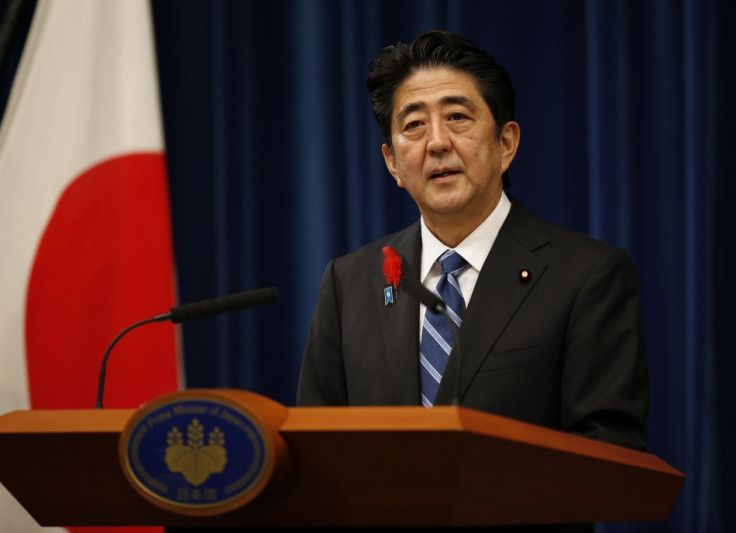Japan's Shinzo Abe Confirms Sales Tax Rise after Survey Finds Strong Business Sentiment [VIDEO]

Japan will raise its sales tax rate to 8% from 1 April 2014 after a key survey of Japanese business sentiment by the Bank of Japan (BoJ) showed that confidence among major business rose to a near six-year high.
In the central bank's tankan survey, a closely-watched measure of corporate sentiment in Japan, a sentiment index for large manufacturers rose to +12 in September from +4 in June.
The latest reading, the best since December 2007, came in well ahead of economists' expectations of +8.
Any positive figure in the survey index indicate that the number of companies that say business conditions are good is more than those that say conditions are bad.
Meanwhile, an index of future conditions of large manufacturers declined by 1 point to +11.
Business sentiment of large non-manufacturers rose to +14 from +12, with the future conditions index remaining flat with the current conditions.
The capital expenditure forecast for companies was revised up to +3.3% year over year from +2% in the previous survey.
Furthermore, the companies expect an exchange rate 94.95 yen against the dollar, compared to the previous rate of 91.20 yen. A weaker yen means increased profits for Japanese exporters.
"We believe the Bank of Japan's September Tankan indicates that the Japanese economy is transitioning from a swift recovery to a phase of stable growth and will continue to recover at a steady rate," said economists at Nomura Research.
Sales-Tax Hike
Prime Minister Shinzo Abe had cited the tankan survey as key factor in deciding whether to raise the sales tax in April to curb its huge debt. Following the survey results, Abe confirmed the tax increase from April next year.
The country is planning to raise the tax further to 10% starting from October 2015.
Japan's public debt is the largest among industrialised nations at more than 1,000tn yen ($10.21tn, €7.56tn, £6.32tn), and the government led by Abe has been taking into account the debt problem while formulating measures to boost economic growth.
Since taking office in December 2012, Abe and the BoJ have unveiled a series of massive fiscal and monetary stimulus to pull the country out of a 15-year deflationary period and boost economic growth.
His policy, generally known as 'Abenomics' involves using the so-called three arrows of fiscal stimulus, monetary easing and a package of growth-oriented initiatives including deregulation.
Economic Stimulus
In order to cushion the bad effects on companies due to the sales-tax hike, the Japanese government is due to announce a stimulus package worth $50bn or more.
Reuters reported citing a draft of the package seen by it that the package will not include income tax rate cuts for companies, but will have tax break provisions.
The government is likely to abolish the special corporate income tax surcharge for funding Tohoku's reconstruction as an incentive to increase wages. The extra tax on individuals to reconstruct the area that suffered from the March 2011 disasters would remain in place.
Meanwhile, the BoJ has been keeping monetary policy unchanged, since it launched its program of quantitative and qualitative easing in April.
"The BoJ's economic outlook factors in a hike in the consumption tax as planned, but not the additional economic stimulus measures we expect to be announced at the same time as the tax hike decision is made," said Nomura economists.
"We accordingly maintain our view that the bank will first confirm the economic situation after the consumption tax is increased before starting to consider any additional monetary easing action."
© Copyright IBTimes 2024. All rights reserved.






